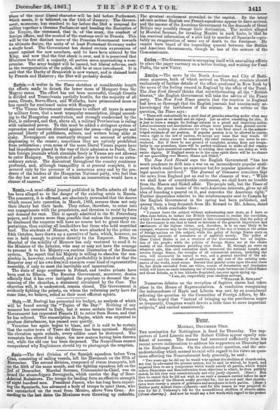Illassia,—A semi-official journal published in Berlin admits all that has
been alleged as to the danger of the existing crisis in Russia. 'The peasantry, it is affirmed, are absolutely persuaded that the decree which comes into operation in March, 1863, secures them not only their liberty but their lands. They refuse, therefore, to enter into any engagements with the proprietors, and threaten to resist by force any demand for rent. This is openly admitted in the St. Petersburg papers, and it seems more than possible that unless the peasantry' can be disabused the emperor will have no course but to grant their ex- pectations, thus ruining all landholders but those who hold unsettled land. The students of Moscow, who were attacked by the police on -240 October, have drawn up a narrative of facts, which, however, no one is bold enough to present directly to the Emperor. Even the Marshal of the nobility of Moscow has only ventured to send it to the Minister of the Interior, who may or may not have the courage to present it to his Majesty—a curious illustration of the Russian system. The report that his Majesty is willing to abandon the cen- sorship is, however, confirmed, and a probability is hinted at that the
• Emperor may of his own freewill summon some kind of representative assembly, if only to meet the inevitable serf insurrection.
The state of siege continues in Poland, and twelve priests have been sent to Siberia. The Russian Government, moreover, denies officially that it has ever instigated the populace to demand the re- opening of the churches, a statement circulated by the Czas. The churches will, it is understood, remain closed. The Government is evidently fighting the priests, on whom the reforming party have for some time, we believe, relied as their most efficient agents.




























 Previous page
Previous page